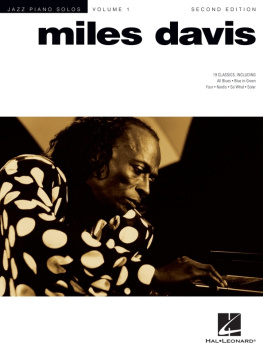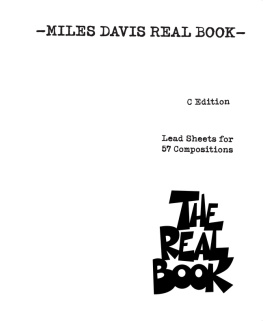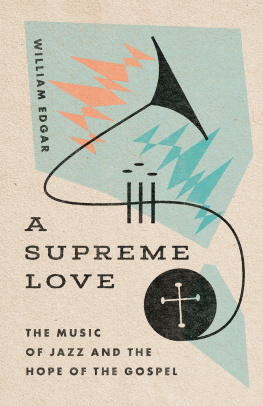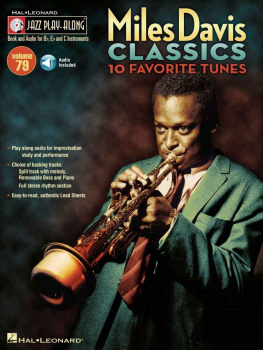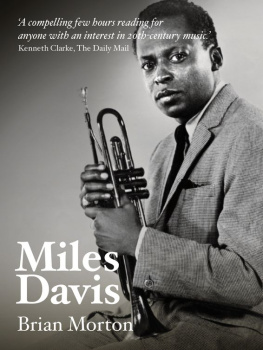Contents
About the Book
Miles Davis remains one of the jazz greats, a crucial influence on the development of jazz over the last five decades, and perhaps the most remarkably original of any musician in the genre.
John Szweds remarkable life explores Miles both in terms of his impact on jazz and as one of the great Black Americans, as political figure, icon and archetypal cool dude. So What fills in the gaps left by myth-making about Miles life, telling the story of his childhood, his depressions and his relationship with heroin as well as his remarkable musical career.
About the Author
John Szwed is Musser Professor of Anthropology, African-American Studies, American Studies and Music at Yale University, and the author of Space is the Place, an acclaimed biography of the jazz musician Sun Ra.
Also by John Szwed
Jazz 101: A Complete Guide to Learning and Loving Jazz
Space Is the Place: The Lives and Times of Sun Ra
So What
THE LIFE OF MILES DAVIS
J OHN S ZWED
To
Roger D. Abrahams
Dan Rose
Robert Farris Thompson
Vamp
Put that down. Put it all down. And listen, dont you try to make me into a nice guy.
M ILES D AVIS
ONE NIGHT WHILE I was having a drink with a friend in a SoHo bar in New York City, an acquaintance of his joined us, and I was introduced to him as someone who was thinking of writing a biography of Miles Davis. He immediately launched into a Miles story, one that was hysterically funny, but one that also seemed highly improbable. When I asked where he had heard the story, he threw up his hands in mock horror: You want attribution? This is Miles Im talking abouthe belongs to everyone! It was only the first of many such encounters, every one of which reiterated a basic lesson about writing about Miles Davis: stories about him are legion, many of them dramatic, and all of them accompanied by strong emotions. Thats the good news. The bad news is that many of them never happened. All of which is to say that his life is now, as it was when he was alive, in the realm of legend.
Part of his legendary status, of course, stems from his unwillingness to be forthcoming about himself throughout most of his life; in fact, that reticence was central to his mystique. Davis claimed not to be able to remember much of his youth, and in the name of change, chose to forget many of his past accomplishments. Writers, as well as the public, looked for some kind of revelation in the few crimped and guarded interviews he did choose to give. But Davis was difficult to approach, quick to anger, and often oblique or contradictory in what he did say. It is no wonder that the interviews that were published nearly always quoted other interviews. Yet in the effort to piece together a full portrait of the man, they sometimes unwittingly repeated errors in the process. Some sense of the dimension of these problems can be grasped when Miles denied the truth of the some of the stories presented in early interviews with him. When he was not asked further about these denials, the information he claimed to be false continued to be repeated, and so seemed to be confirmed in everything written about him.
Miles life as a whole is not easy to grasp, and the meaning of it, with or without his help, is resistant to quick interpretations. This is not to say that any life is easy to fathom and render into words. Novelist Martin Amis put it this way: The trouble with life is its amorphousness, its ridiculous fluidity. Look at it: thinly plotted, largely themeless, sentimental and ineluctably trite. The dialogue is poor, or at least violently uneven. The twists are either predictable or sensationalist. And its always the same beginning; and the same ending. What makes the problem worse in our own time is that celebrity biographies serve the function once served by novels, their authors bent on creating organic, convincing narratives that explain everything their subjects have ever done or said, even if it means reading their minds to explain their behaviorhe wondered, she thoughtwith speculation taking over where there are no facts to help, leaping across the gaps, forgetting that no life is ever led the way a biographers story line is written. In biographical writing, the urge to fill in the blanks, thicken the story line, provide missing motivation, and heat up the significance is hard to resist, and it has turned more than one biographer into a novelist.
A word, then, about the intentions of this book. There already exist several biographies of Miles Davis, as well as his autobiography and a memoir from his collaborator. I found all of them interesting and useful, drew on them in my writing, and strongly recommend them to anyone seriously interested in Miles life and work. Why then am I writing yet another Davis biography? One answer is that there is still more to be known and a number of misunderstandings to be corrected. To do this, I have gone back to the transcripts of Davis interviews conducted by his autobiographer, Quincy Troupe (housed in the Schomburg Library in New York City), in search of material not used in Miles: The Autobiography, or looking to highlight what was used in the autobiography in different ways. (Although I was not able to quote directly from those interviews, I have paraphrased their contents.) I have also examined and drawn on Alex Haleys extensive notes (also at the Schomburg) for his Playboy interview with Miles, as well as on the Teo Macero Collection at the New York Public Library of Performing Arts at Lincoln Center. Numerous people were also interviewed for this book, especially those family memberslike Davis brother, Vernon, common-law wife, Irene, and son, Gregoryand fellow musicians, such as Allen Eager and Stan Levey, who had not been spoken to for previous publications. In addition, Ive drawn freely (and with thanks) on Davis published interviews, especially some of those not so well known or in other languages than English. I hope that readers will find here some new information on Davis youth, his stay at Juilliard, his time in Detroit, his lovers, his music, his business affairs, and the man himself.
A second answer to why another biography on Miles Davis is that this is not a biography in the contemporary sense, as it does not attempt to track down every event or person in his life. Nor is it strictly a musical study, especially because not all of his music is discussed. (I have, however, attempted to make the case for some of Davis early recordings with Charlie Parker, which are often passed over, as well as for some of his mid-1970s recordings, which even his biographers dont like.) What I am attempting to do in this book might better be described as a meditation on Miles Davis life, one that looks at the variety of meanings that were (and continue to be) projected onto him. Davis embodied a large array of such meanings, many of them apparently contradictory, and he created a public self that was at times even larger and more complex than that of the private person.



